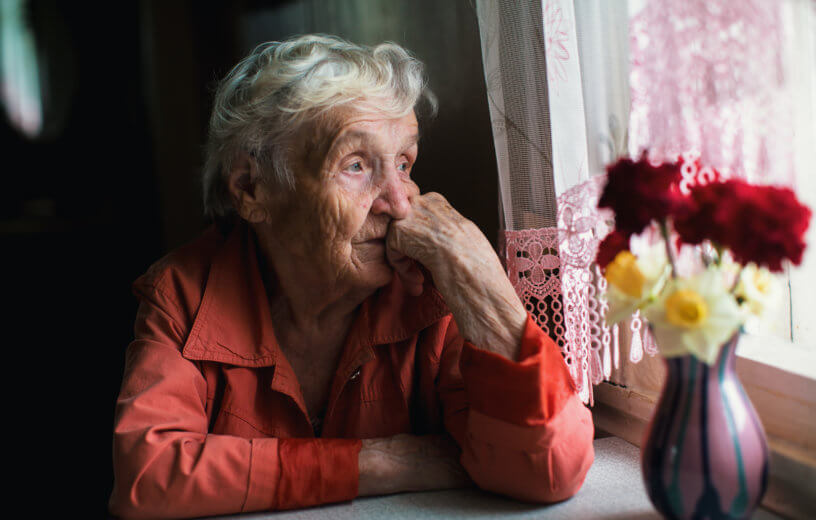SAN FRANCISCO — Modern medicine has come a long way, and people these days are living longer than ever. Generally speaking, that’s a positive development, but it also means a whole lot more older individuals with cognitive decline are living alone. Estimates show that one in four older Americans diagnosed with dementia or mild cognitive impairment live by themselves. Even worse, researchers from UC San Francisco report that the U.S. health system is woefully unequipped to serve patients living alone with cognitive decline.
Researchers warn that as the population continues to grow older, this problem is only going to get worse. First author Elena Portacolone, PhD, MBA, MPH, of the UCSF Institute for Health and Aging and the Philip R. Lee Institute for Health Policy Studies, believes that for these patients living alone is as big a social determinant of health as poverty, racism, and low education.
When an individual with either cognitive impairment or dementia lives alone, they’re at a much higher risk of making mistakes like forgetting appointments and mixing up their medications. Many living alone have no one to contact in the event of an emergency as well. These individuals are also at a higher risk of potentially dangerous behaviors like getting behind the wheel of a car or wandering around on foot.
While conducting this study, researchers interviewed 76 healthcare providers (physicians, nurses, social workers, case workers, and home care aides). These professionals worked in a variety of settings, such as memory clinics, home care services, and social services across three states (Texas, Michigan, and California).
Participating providers raised a number of concerns about patients living alone missing medical appointments, failing to respond to follow-up phone calls, and forgetting why appointments were made in the first place. All of those possible developments can put a patient at major risk of falling off their doctor’s medical radar, so to speak.
“We don’t necessarily have the staff to really try to reach out to them,” explains one physician during an interview.

Certain patients couldn’t provide their doctors with missing information on their charts, leaving providers to guess about the pace of their health and potential decline. Many others had no names listed as emergency contacts.
“Not a family member, not even a friend to rely on in case of a crisis,” a case manager says.
Patients living alone are also at risk for untreated medical conditions, self-neglect, malnutrition, and falls. A house service coordinator even added that calls to Adult Protective Services were at times dismissed until a patient’s situation became very serious. Study authors note that most patients were not even identified until they had been sent to a hospital following a crisis like a fall or bad reaction to medication mismanagement.
Some patients were even released without any support system in place. One actual case saw a patient sent home with a taxi voucher. A psychiatrist likened that situation to “sending a kid out to play on the freeway.”
All in all, Dr. Portacolone says these findings serve as an indictment of the U.S. healthcare system and its failure to provide adequate subsidized home care aides for all but the lowest-income patients.
“In the United States, an estimated 79% of people with cognitive decline have an income that is not low enough to make them eligible for Medicaid subsidized home care aides in long-term care,” Dr. Portacolone explains in a university release, adding that the threshold for a person living alone in California is $20,121 per year.
While Medicare is indeed available to adults aged 65 and older, subsidized aides are usually only provided following acute episodes like hospitalizations, and even then, only for fixed hours and limited durations.
“Most patients need to pay out-of-pocket and since cognitive impairment can last for decades, it is unsustainable for most people. Aides that are available via Medicaid are very poorly paid and usually receive limited training in caring for older adults with cognitive impairment,” she adds.

Outside the borders of the U.S., a significantly larger percentage of people living in parts of Europe, Japan, and Canada generally enjoy much greater access to subsidized home care aides. Dr. Portacolone was the senior author of a 2021 study covering 13 countries that concluded as much.
All in all, senior author Kenneth E. Covinsky, MD, MPH, of the UCSF Division of Geriatrics believes this work highlights substantial deficiencies in how the American health system provides for dementia patients.
“In an era when Medicare is going to spend millions of dollars for newly approved drugs with very marginal benefits, we need to remember that Medicare and other payers refuse to pay far less money to provide necessary supports for vulnerable people with dementia,” he comments.
In conclusion, the research team calls for a revised system in which robust support is made available via funding from expanded Medicare and Medicaid. This will become increasingly important, Dr. Portacolone concludes, “because effective treatments to reverse the course of cognitive impairment are unavailable, childlessness and divorce are common, and older adults are projected to live longer and often alone.”
The study is published in JAMA Network Open.

